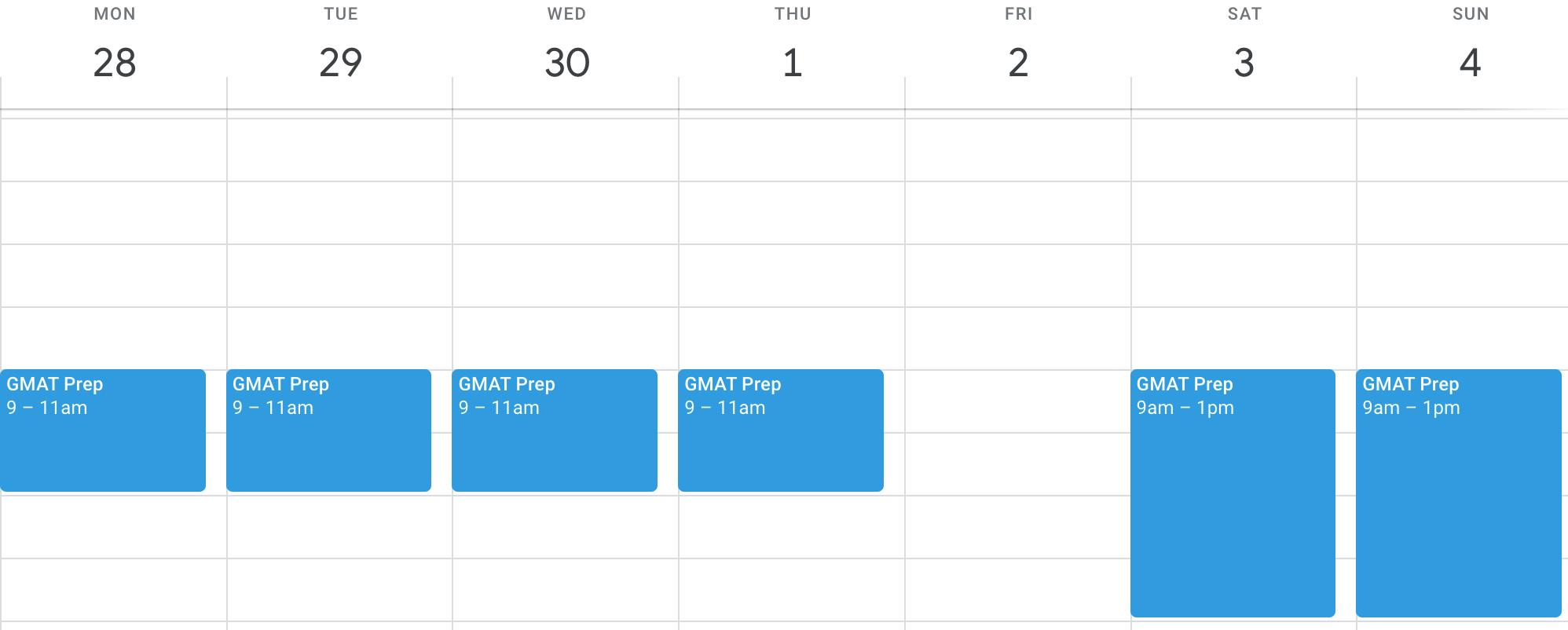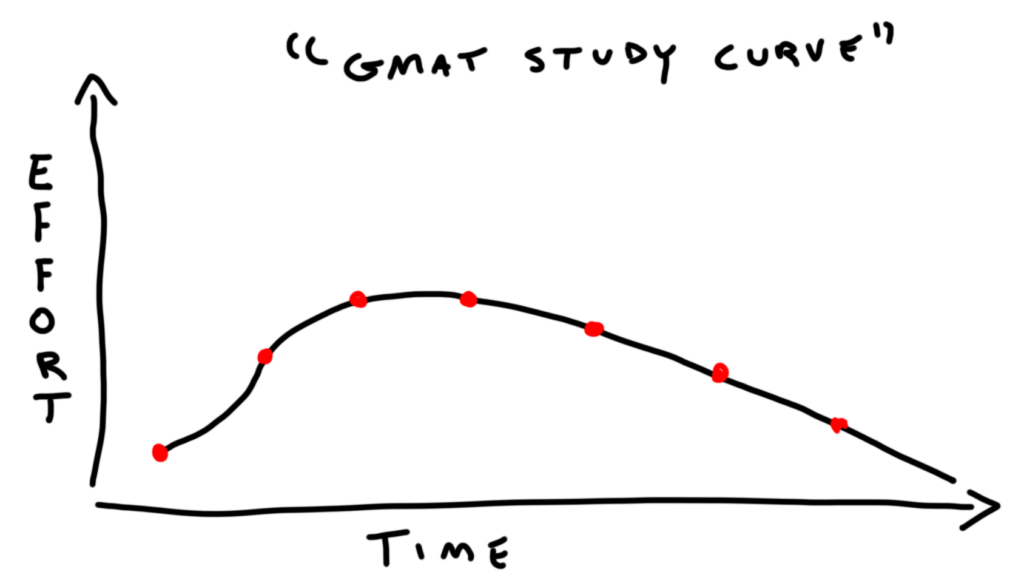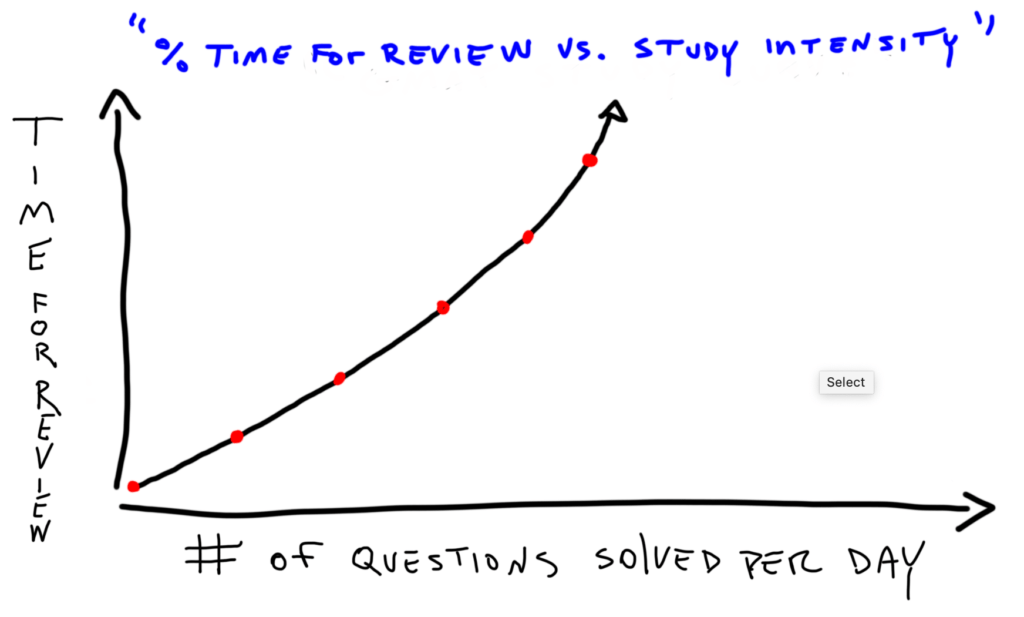How many hours should you devote to GMAT studying and what is the max and min you can do while still being productive?
There’s a super common curve to GMAT studying.
Incredible excitement, dedication, and energy near the start.
Ready to make a change.
Ready to have an awesome GMAT score for your HBS app.
Ready to sweep the rest of your responsibilities out of the way to make this happen.
There is the glow of something new. Without compromise.
Fresh. Unknown. Full of hope…
Most people hit a wall
Yes, there are those lucky ducks who take a first practice test, hit a 710, put some polish on things and a month later have a 730 in the bank.
It can be that easy. Sometimes.
Most of the time it isn’t.
That doesn’t mean that most people have a horrible time studying for the GMAT.
GMAT prep can take many hundreds of hours and require a substantial energy investment but still be very positive.
Even if at times it may be a slog and require some tough choices.
To stay on course for the long haul, it’s important to approach studying with the right intensity.
A large portion of that intensity relates to the number hours you study each day/week.
And we’ll get into all of the details below outlining ideal GMAT study time.
Let’s get down to the brass tax of GMAT study hours
Our standard GMAT tutoring client is:
-In their mid 20s
-Working a demanding job (Consulting, Investment Banking…)
-Aiming for an M7 MBA
For this profile we aim for a maximum of two hours of GMAT homework per day on the weekdays with Friday as a day off and three to five hours of homework on each weekend day (depending on what we are working on).
If taking a practice test on the weekend then the study day is closer to five hours.
For most people the above will provide a good balance of doing enough for steady progress but not overloading and burning out.
The GMAT is a jog not a sprint.
You want to find an appropriate pace that you can hold steady for a while.
What if I am ready for full time GMAT studying?
Have more time to study? Great.
You can do more.
But, it’s important to realize that there is only so much that you can learn in a certain period of time (even if you are dedicating 100% of your time and effort to GMAT prep).
Given 100% GMAT I would treat every day as a weekend and do 3-5 hours per day.
A great chunk of that should be spent on review not tread-milling through questions.
The more compact the preparation the greater proportion of study time you will need to spend on review
Why?
Learning a greater number of topics in a shorter period of time is more difficult.
So, to do that successfully you will need to spend more time digging into the details and consolidating your knowledge to makes sure that you have it all learned properly.
Again, there is a limit to what you can intake in a given period of time. So don’t overdo it.
Consistency and quality are key.
Also, don’t underestimate the value of rest and relaxation.
That 11th hour of studying in a day may be entirely unproductive or potentially counterproductive.
What if I have less time than the standard?
What if you are busy to the point that there is very little room for GMAT studying but you need to get started.
This can be done.
At least for the first half or so of the preparation (working more on the fundamentals) you can do things slower and not reduce the quality (at some point you will have to ramp up and make GMAT more the center of your life).
In this case I would aim for three 90-minute sessions for the weekdays and 3 hour study sessions per weekend day.
Still not manageable?
You could split the three 90-minute minute weekday sessions in two.
Do 45 minutes in the morning and 45 minutes at night (or at a time during the day when you can focus).
But don’t half ass at it to check off the box.
This more compact studying can be great.
But don’t start your GMAT preparation if you really don’t have the time to do it.
You will end up wasting effort for very little potential progress.
It’s possible you could scale back a bit more but…
You could reduce the hours but this likely isn’t going to work for very long especially if you are aiming for a 700+ GMAT score and have a ways to go.
You could do a majorly reduced schedule to earn your stripes for GMAT fundamentals and little bit more but in acclimating to the more subtle content you will need to immerse yourself. At least most people do. I did.
In this case you could aim for 3x1hr weekday sessions and 2hrs on each weekend day.
In this tutoring client debrief we created one of these ultra light schedules and it worked extremely well.
However, we also met three times a week for tutoring sessions so that helped balance things out quite a bit.
And he was aiming for high 600s not 730+.
Life Happens
No matter how much you dedicate yourself to your GMAT prep it is nearly impossible to eliminate all distractions.
There’s going to be a wedding.
A trip that was planned before deciding to commit to studying.
An unexpected work commitment.
An unexpected family commitment.
Not to mention: exhaustion.
At some point you might just a need a few mental health days to regroup.
As long as you are honest with yourself about these things you will be fine.
As long as they are the exception. A rarity. A blip.
And for the most part if the preparation is high quality and consistent you will be totally fine missing a few study days or even taking an entire weekend off.
Yes, weekends are extremely important because you are at your freshest and we just don’t have these chunks of uninterrupted focused time on the weekdays.
So missing an entire weekend is a loss.
That said, if it’s one or two weekends in the entire preparation and you plan ahead (as much as you can) so that your studying is the least interrupted then you will be fine.
But, if you are facing consistent interruption of your GMAT studies then you may have a serious issue with your progress.
You need to get your studying on a grid and keep steady.
That just makes it easier.
Easier to commit to.
Easier to track.
The quicker you commit to dedicating time in your schedule to GMAT studying the quicker you will be done with GMAT studying.
In my experience, when you don’t quite commit you end up committing way more resources to GMAT prep then you would had you just gone full blast from the start.
You will have to make some tough choices. And you may feel that you are missing out on things.
But trust me. Commit now and you will be back to normal much faster.
A few things to keep mind for your study sessions
-Review is the most important thing
-Whether review or doing sets stay high quality
-Be realistic. You can’t cram everything in a day but here is also a minimum amount of effort to push yourself forward.
Here are more GMAT study skills to turbo charge your sessions.
GMAT Study Time Conclusion
You can do things faster.
You can do things more spread out.
But most people do well somewhere in the middle (approximating what we do in the tutoring program).
We’ve tested GMAT study pacing over a decade of tutoring and our method has worked exceptionally well for a broad range of people aiming for remarkable GMAT scores.
GMAT Study Time FAQ
Can I limit my studying to weekdays?
Assuming that you are aiming for a top GMAT score and working a full time job then it is unlikely that you will succeed squeezing GMAT studying into your already rather full week.
The weekends are usually when you are most rested and focused. It is a big sacrifice to lose this time.
Can I limit my studying to weekends?
Probably not. It is going to very difficult to hit your stride with only two GMAT prep days per week. You might say: well, I can put in 10 hours each weekend day and that is more HW then Atlantic assigns every week.
Yes, that’s true. But, imagine eating all of your meals on the weekend and having nothing during the weekdays.
You will take in all of the calories that you need but that’s going to work is it?
You can make a similar analogy with working out.
The point is, cramming generally doesn’t work well.
So trying to fit your GMAT studying into two weekend days probably won’t work well either.
What about studying in the morning before work?
Yes! This can work. You might not be able to get all of your work done but getting half done or even a solid 30 minutes can be a fantastic way to balance the load.
What about studying at lunch time?
Yep. This can be good. However, let’s make sure that you keep the quality high. Doing HW quizzes while worried that your boss is going to discover that you are studying for the GMAT isn’t ideal.
So, yes, putting in a solid 30 minutes at lunch can be great but make sure that you are focused and actually working productively.
Is there anything I can do while I work out?
Besides working out? I would avoid multi tasking while studying. That leads to low quality work. Getting some exercise is excellent in and of itself. No need to add GMAT studying on top of it.
I have a one week planned vacation, is that OK?
Probably fine but really depends on when it is planned for. The week before your GMAT? Obviously not great. But if at some normal week in the middle of your preparation you need to take a week off that is OK.
Some people like to study while away but that is really a personal choice.
The once thing I would avoid: half assed vacation studying.
You are much better off just taking the time to recharge than doing any low quality work.
All of this is assuming that you are already doing a great job with your GMAT prep.
If you have been inconsistent and then are taking an entire week off that is a different story.
Is there anything I can do on my commute?
This is like lunch time studying. Yes, you can be productive on your commute but find something to work on that gels with the commute.
For instance, you could read a challenging economist article.
Or maybe do some reading comprehension (since it doesn’t”t require much writing).
But trying to do a bunch of math calculations might not be productive.
It’s also OK to zone out and listen to some music or engage with a podcast.
GMAT prep doesn’t have to be 24/7.
It’s important to have rest time.


